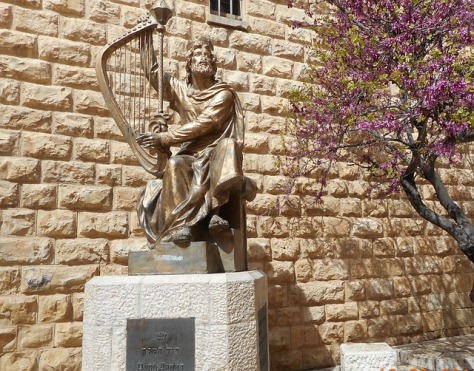
The chastisements, which were the natural fruits of David's sin, soon began to show themselves, though apparently ten years at least passed before Absalom's revolt, at which time he was probably a man of sixty. But these ten years were very weary and sad. There is no more joyous activity, no more conquering energy, no more consciousness of his people's love. Disasters thicken round him, and may all be traced to his great sin. His children learned the lesson it had taught them, and lust and fratricide desolated his family. A parent can have no sharper pang than the sight of his own sins reappearing in his child. David saw the ghastly reflection of his unbridled passion in his eldest son's foul crime (and even a gleam of it in his unhappy daughter), and of his murderous craft in his second son's bloody revenge. Whilst all this hell of crime is boiling round him, a strange passiveness seems to have crept over the king, and to have continued till his flight before Absalom. The narrative is singularly silent about him.
He seems paralysed by the consciousness of his past sin; he originates nothing. He dares not punish Ammon; he can only weep when he hears of Absalom's crime. He weakly longs for the return of the latter from his exile, but cannot nerve himself to send for him till Joab urges it. A flash of his old kingliness blazes out for a moment in his refusal to see his son; but even that slight satisfaction to justice vanishes as soon as Joab chooses to insist that Absalom shall return to court. He seems to have no will of his own. He has become a mere tool in the hands of his fierce general—and Joab's hold upon him was his complicity in Uriah's murder. Thus at every step he was dogged by the consequences of his crime, even though it was pardoned sin. And if, as is probable, Ahithophel was Bathsheba's grandfather, the most formidable person in Absalom's conspiracy, whose defection wounded him so deeply, was no doubt driven to the usurper's side out of revenge for the insult to his house in her person. Thus "of our pleasant vices doth heaven make whips to scourge us." "Be not deceived; whatsoever a man soweth, that shall he also reap."
It is not probable that many psalms were made in those dreary days. But the forty-first and fifty-fifth are, with reasonable probability, referred to this period by many commentators. They give a very touching picture of the old king during the four years in which Absalom's conspiracy was being hatched. It seems, from the forty-first, that the pain and sorrow of his heart had brought on some serious illness, which his enemies had used for their own purposes, and embittered by hypocritical condolences and ill-concealed glee. The sensitive nature of the psalmist winces under their heartless desertion of him, and pours out its plaint in this pathetic lament. He begins with a blessing on those who "consider the afflicted"—having reference, perhaps, to the few who were faithful to him in his languishing sickness. He passes thence to his own case, and, after humble confession of his sin,—almost in the words of the fifty-first psalm,—he tells how his sickbed had been surrounded by very different visitors. His disease drew no pity, but only fierce impatience that he lingered in life so long. "Mine enemies speak evil of me—when will he die, and his name have perished?" One of them, in especial, who must have been a man in high position to gain access to the sick chamber, has been conspicuous by his lying words of condolence: "If he come to see me he speaketh vanity." The sight of the sick king touched no chord of affection, but only increased the traitor's animosity—"his heart gathereth evil to itself"—and then, having watched his pale face for wished-for unfavourable symptoms, the false friend hurries from the bedside to talk of his hopeless illness—"he goeth abroad, he telleth it." The tidings spread, and are stealthily passed from one conspirator to another. "All that hate me whisper together against me." They exaggerate the gravity of his condition, and are glad because, making the wish the father to the thought, they believe him dying.
"A thing of Belial" (i.e., a destructive disease), "say they, is poured out upon him, and now that he lieth, he shall rise up no more." And, sharpest pang of all, that among these traitors, and probably the same person as he whose heartless presence in the sick chamber was so hard to bear, should be Ahithophel, whose counsel had been like an oracle from God. Even he, "the man of my friendship, in whom I trusted, which did eat of my bread"—he, like an ignoble, vicious mule—"has lifted high his heel" against the sick lion. We should be disposed to refer the thirty-ninth psalm also to this period. It, too, is the meditation of one in sickness, which he knows to be a Divine judgment for his sin. There is little trace of enemies in it; but his attitude is that of silent submission, while wicked men are disquieted around him—which is precisely the characteristic peculiarity of his conduct at this period. It consists of two parts (vers. 1-6 and 7-13), in both of which the subjects of his meditations are the same, but the tone of them different. His own sickness and mortality, and man's fleeting, shadowy life, are his themes. The former has led him to think of the latter.









